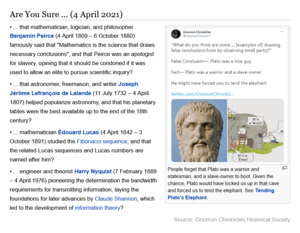April 4: Difference between revisions
No edit summary |
No edit summary |
||
| Line 5: | Line 5: | ||
<br style="clear:both"> | <br style="clear:both"> | ||
[[File:Are You Sure (April | [[File:Are You Sure (4 April 2021).png|thumb|left|Screenshot: Are You Sure (April 4, 2021)]] | ||
<br style="clear:both"> | <br style="clear:both"> | ||
Revision as of 18:39, 4 April 2021
Are You Sure ... (April 4)
• ... that mathematician, logician, and philosopher Benjamin Peirce (4 April 1809 – 6 October 1880) famously said that "Mathematics is the science that draws necessary conclusions", and that Peirce was an apologist for slavery, opining that it should be condoned if it was used to allow an elite to pursue scientific inquiry?
• ... that astronomer, freemason, and writer Joseph Jérôme Lefrançois de Lalande (11 July 1732 – 4 April 1807) helped popularize astronomy, and that his planetary tables were the best available up to the end of the 18th century?
• ... mathematician Édouard Lucas (4 April 1842 – 3 October 1891) studied the Fibonacci sequence, and that the related Lucas sequences and Lucas numbers are named after him?
• ... engineer and theorist Harry Nyquist (7 February 1889 – 4 April 1976) pioneering the determination the bandwidth requirements for transmitting information, laying the foundations for later advances by Claude Shannon, which led to the development of information theory?
On This Day in History and Fiction
1807: Astronomer, freemason, and writer Joseph Jérôme Lefrançois de Lalande dies. As a lecturer and writer Lalande helped popularize astronomy. His planetary tables were the best available up to the end of the 18th century.
1809: Mathematician Benjamin Peirce born. Peirce will make contributions to celestial mechanics, statistics, number theory, algebra, and the philosophy of mathematics; he will become known for the statement that "Mathematics is the science that draws necessary conclusions".
1826: Electrical engineer Zénobe Gramme born. Gramme will invent the first usefully powerful electric motor.
1842: Mathematician Édouard Lucas born. Lucas will study the Fibonacci sequence; the related Lucas sequences and Lucas numbers will be named after him.
1919: Chemist and physicist William Crookes dies. Crookes was a pioneer of vacuum tube technology, developing the partially evacuated Crookes tube circa 1869-1875.
1923: Mathematician and philosopher John Venn dies. Venn invented the Venn diagram, now widely used set theory, probability, logic, statistics, and computer science.
1941: Chemist Lazăr Edeleanu dies. Edeleanu invented the modern method of refining crude oil, was the first chemist to synthesize amphetamine.
1976: Engineer and theorist Harry Nyquist dies. Nyquist did early theoretical work on determining the bandwidth requirements for transmitting information, laying the foundations for later advances by Claude Shannon, which led to the development of information theory.
1977: Game designer, shop keeper, and outsider mathematician Dave the Gamer announces "Buy n, get n free" sale on all lucky dice in the store.










